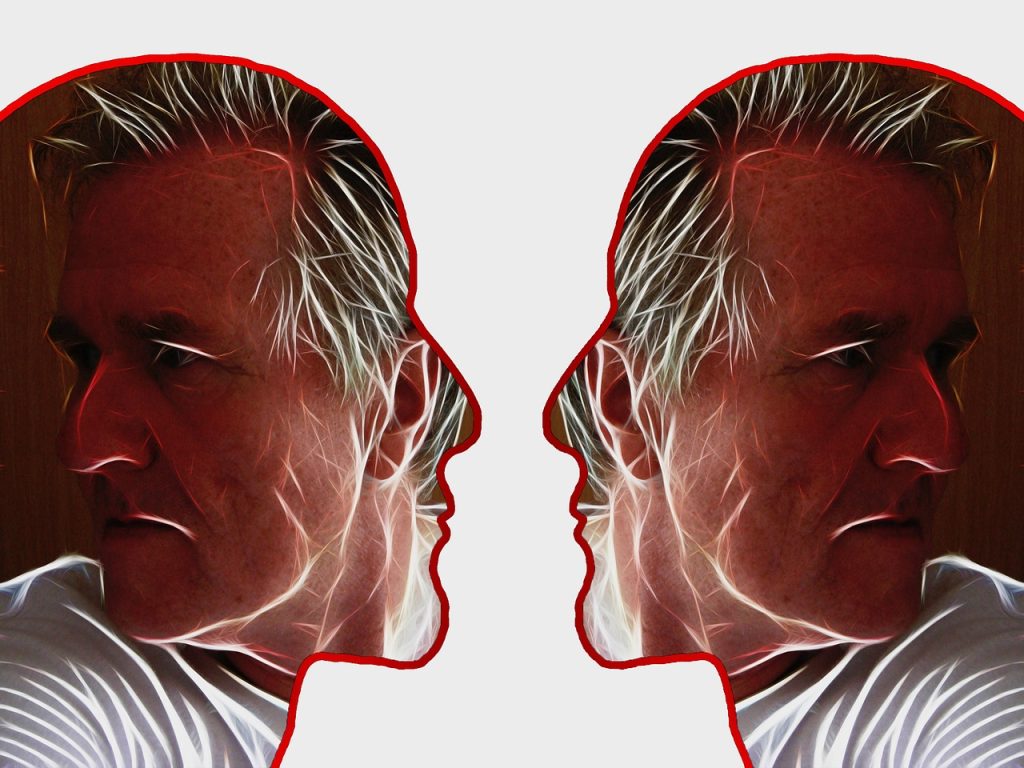It’s been a few months since my EUPD diagnosis and I’ve been radio silent for the majority of that. I have spent this time trying to focus on the first steps in my two year SCM (Structured Clinical Management) journey and trying to understand the diagnosis. As part of this, I will try and portray what I’m learning along the way, as I did whilst in Trauma Group. I will start that by explaining some key features of EUPD/BPD and discuss if and how they present in myself. I hope with this I am not only able to recognise and hopefully manage my triggers more efficiently but that people can gain some understanding on the difficulties faced each day by people diagnosed with EUPD/BPD.
Fear of Abandonment

Fear of rejection or abandonment may be traumatic and triggering for those with EUPD/BPD and even the slightest shift of tone in one’s voice, a different-than-usual ending to an email, a late reply on a text can be very difficult to emotionally deal with. This can cause intense feelings of unwantedness, self-doubt and a loss of purpose.
The fear of abandonment or rejection may cause frantic or desperate behaviour such as clingy relationships or overcompensating with overly ‘needy’ behaviours to preempt any sense of loss and to seek validation.
Although the roots of this struggle are thought to stem from earlier, childhood experiences, losses or rejections in later life can exacerbate the difficulties faced.
I definitely struggle with this and it only becomes more prominent with each rejection faced, leading into trauma stacking. As described above, the feelings felt are very high intensity and negative, I lose all confidence and fall into a vicious cycle of remembering all negatives that I’ve gone through in my life, I have flashbacks of traumatic moments and hyper-fixate on them especially those involving rejection or loss. I will blame myself for everything that I have loved and lost and spiral into a depressive episode. It may sound like I understand it well, so I should be able to control it well but it all happens so fast and takes over in such a formidable way that I struggle to not fall into it, but I’m learning and in moments like this, I try my grounding techniques such as petting my dog, simple breathing exercises or water on pressure points (a personal favourite as I’ve always been a water lover) to try and get myself out of the spiral before it escalates.
Unstable Relationships
It’s normal for someone with EUPD to have intense relationships due to having extreme connection difficulties. I have previously touched on idolisation but to briefly recap, it’s placing someone on such a high pedestal, ‘mirroring’ their behaviour in an attempt for them to ‘like’ you, not being able to focus without their validation or love and again, hyper-fixating on their existence and the relationship. Devaluation on the other hand is that mood switching to the opposite – feeling intense feelings of disgust, emotional distance from that person. With the idolisation and devaluation unpredictability in relationships can be a big struggle.
This is usually called a ‘split’ or ‘splitting’ within the community.
I really struggle with idolisation and always have done, since I was a child but I can’t seem to devalue people. I struggle with intense empathy and devalue myself rather than others, so although I resonate with the idolisation fully, I don’t think the devaluation affects me. For me, ‘splitting’ more refers to when I go from euphoric, confident, brave, active and positive to my ‘crashes’ when I break down, lose all confidence and go into the ‘spiral’ mentioned in the ‘Fear of Abandonment’ section above.
Emotional Instability

What are classed as ‘minor’ events may cause rapid mood changes in someone with EUPD/BPD, these are ‘triggers.’ As mentioned in the beginning of the blog, these can be as small as a work e-mail seeming slightly out of context, someone not answering their phone immediately, someone not being able to make a commitment. The responses given by the ‘triggered’ individual are likely to seem disproportionate.
I understand this well and think explaining it anecdotally, or in a slightly more personal tone may be beneficial here. I could be on top of the world, and I could spill my water after accomplishing and enjoying a great day and I could feel like I have failed at everything in my life, that I will never succeed at everything and that anything I have ever achieved has just been by ‘luck’ but all the negatives in my life have been ‘deserved’
Of course it’s not always this minor of an instance, but I can’t say it’s not happened before. These emotions are often overwhelming and completely consuming.
DBT (Dialect Behaviour Therapy) is something I’ve been hearing a lot about since my diagnosis. Unfortunately, it’s not part of my SCM but there may be overlapping information such as coping strategies and mindfulness practices. I find journaling helps me. Not only is it a distraction from maladaptive coping strategies, but my caseworker has recently taught me a way on how to break down the feelings in each sentence that I have written down to try and recognise my feelings and triggers. For example, if I write ”I didn’t deserve this” what does that mean? Does that mean I feel hurt? If so, who hurt me? Why did it hurt? What triggered this feeling for me? Not only does it give me something to focus on, but it helps my overall therapy journey in trying to recognise my triggers and validation in them too as there’s no censorship when I journal, I can write out exactly what I feel, which helps me to feel ‘listened to’ and ‘understood’ even if only by myself.
Another thing that works great for me is progressive muscle relaxation, where I tense and relax muscles starting from my head to my toes, mirroring the action on both sides.

Impulsivity
From self-injury to impulsive behaviour, unsafe sex, putting one’s self directly or indirectly in harm, excessive spending and substance abuse, impulsivity can cover a lot. These are often to feel immediate release from the pain or confusion the person is feeling, often during moments of a ‘split’ though although they can offer short term release, they can then be followed by feelings of guilt, feeling misunderstood or not understood at all and interpersonal conflict, especially if this is a relapse and has caused the person to ‘go back’ on their healing journey. For emotional dysregulation, impulsivity is both a symptom and a maladaptive coping mechanism.
I would say I moderately suffer from this. Excessive spending and self-injury have been past problems of mine and with my passive suicidal tendencies, I have also directly or indirectly put myself in harms way multiple times. I would say the ‘impulsivity’ for me is the stage where I just want to live life ‘care free’ and I am trying to trick myself into thinking that I have no problems and that I can face the world as a ‘strong and fierce’ person. I use it as a coping strategy but it is also a sign of worsening mental health in myself.
Identity Disturbance
Having a fluctuating self-image is very normal with EUPD/BPD and as described above, I can go from feeling unstoppable, overly confident, proud of myself and hopeful for the future whilst enjoying the current moment to feeling as if I have only ever lost everything in life, have achieved nothing and will never achieve anything, that I will never have or be deserving of love and that everyone around me is simply there because they ‘have to be’
This is what I define as a ‘split’ in my own terminology for my illness. This can happen in the matter of a few seconds, for no apparent reason at all (maybe I will grow to learn the reasons as I start discovering my and noticing my triggers) and can take hours, days or even longer to get out of. It can be absolutely exhausting and often feel like all the progress I have is lost. It can feel like a major setback and can tie into the idolisation as seeking external validation in moments like this is common due to the confusion and internal conflict the person is facing.
In these moments I try to utilise my crisis plan. I’m very lucky that I have had the intervention which means I have a professionally collated plan; but they can be made at home and can be even more beneficial when given out to your support circle. Write down your first, second and third stage safety plans in order of severity of the crisis. In the first stages, use the first stage techniques such as mindful breathing, smelling a ‘happy’ or even just a non-triggering ‘strong’ smell or put on a song that always makes you want to dance. If these don’t work you can increase the difficulty of the task, such as water on pressure points, holding ice in your hands, standing barefoot outside for a few seconds and just taking a deep breath, journaling could be good ideas. The ‘crisis’ point that I class as severe are my third stage techniques which usually include reaching out to a support member may this be a helpline, a friend, a family member of my crisis team or it could be a PRN medication.
Chronic Feelings of Emptiness
To be diagnosed with EUPD, the symptoms presenting must be persistent. The feeling of emptiness I will describe is a chronic feeling of deep emptiness with loss of purpose and self identity, causing severe disturbances and presenting difficulties on a day to day basis. This can and usually leads to depression and comorbidity in mental health, which I will discuss in a future post.
I have struggled with depression for a long time, as long as I can remember, so for me I don’t really know what it feels like to not feel chronically empty; however when these feelings intensify I usually end up in the ‘impulsivity’ stage. Socialising and being out of the house, in public makes me feel better, it makes me feel more human and part of the world. The outside is full of distractions too so it’s great to take five minutes, even if it’s just to the end of the road and back.
Inappropriate or Intense Anger

Anger, just like most other emotions in EUPD/BPD can flare up quickly from a mild situation, or a ‘trigger’ The responses may often be disproportionate and ‘over the top’ This can be distressing for anyone surrounding the person, and cause difficulties in relationships as previously touched on. It can also cause additional difficulties for the person with EUPD/BPD as then feelings of guilt may then arise, causing them to sink deeper into their chronic feelings of emptiness.
A lot of relationships break down due to anger and this will only increase the fear of abandonment. See how everything is just a vicious cycle?
I have had outbursts previously, often when I ‘split’ and start feeling empty, worthless, lost and hopeless. I have found therapy to work best with this, and I have increased my communication with my loved ones, I have started becoming a lot more honest with my feelings and can be clear with my words. Where I would previously burst out into anger episodes, I now can express my feelings in a calmer manner and then I usually take myself away from the situation to practice some coping techniques until I feel calm enough to proceed with communication.
Dissociation or Transient Paranoia
Just as certain levels of anxiety are normal, so is a certain’ fight or flight’ response. In patients with EUPD/BPD under intense emotions, there may be short moments of paranoia (where they feel everyone is out to harm them) or dissociation (where they feel disconnected from reality and society). This is an intensified version of our ‘fight or flight’ response. This is a coping mechanism and although typically transient, it’s important to seek therapeutic help.
I am thankful to say that I have not yet suffered from paranoia but the dissociation, not feeling like I belong has been a difficult thing for me to cope with. The feelings of isolation and being misunderstood can weigh heavily on a person. Despite not wanting to in moments like this, I tend to try and socialise to try and help with this as the ‘opposites method’ (where you do the opposite of what your brain is telling you to do) can be really beneficial. I usually start off slow, so rather than gathering a bunch of friends for a meal, I’ll go shopping alone, or I’ll go for a coffee with my husband or go to my mum’s. This way, I am stepping out of my comfort zone without pushing my own boundaries.
It All Ties In
The features mentioned above are very rarely isolated, meaning more than one of them or even all of them are felt at one time. It’s a cycle. For example, the anger can cause instable relationships, this can cause fear of abandonment, this can then cause chronic feelings of emptiness and so on.
My Progression
I’m currently towards the end of my assessment stage of my SCM. I see my therapist once a week and discuss my progress, my triggers, my traits, my emotions, coping skills and grounding techniques, we unravel trauma and learn about my warning signs as well as what to do when I notice any deterioration. I have just learnt about relationships and social functioning support and hope that this will continue as I would like to become more assertive in certain areas of my life, a goal of SCM treatment. We will focus on having structured daily routines to help with impulsivity and inconsistency. There will be group sessions to come prior to my discharge period in roughly 18 months. I am continuing to take my medication and it works well for me. Unfortunately, my GP is still struggling to prescribe correctly and I find myself having to withdraw once every two weeks for a few days. Despite this, I’m still making progress and I look forward to learning more, sharing more. I am finding my community and spending time trying to understand myself more. I am trying to hold the faith that this is going to be a journey I can get through, as I’ve been told that it’s possible that the diagnosis could be retracted in the future.
I am now a year on from being in the crisis home and 8 months into my involvement with the CMHT (Community Mental Health Team) and I have made a lot of progress.

Therapy and Breaking the Stigma
From the therapy I received in the crisis home, to the 1-2-1 support I have been receiving for the past 8 months, it’s the medication that keeps me alive, but it’s the therapy that makes me feel alive. Knowing that I’m ‘normal’ amongst all of this, knowing that it’s not my fault, knowing that it’s an illness is validating. There are many misconceptions that EUPD/BPD is an excuse to be manipulative and it’s something that I will address later in more detail in another blog but EUPD/BPD has been found to change the brain. Nobody would want to live with all the features mentioned above and it’s (on a personal level) been debilitating. The signs of emotional dysregulation were there 20 years ago with myself and no seven year old child ‘chooses to be manipulative’
I’m excited that I’m still here fighting this fight, and winning it every day and that I’m using it as an opportunity to grow, to learn. I have been given an amazing opportunity to heal, and I can’t let it go by without giving it my best shot. I owe it to myself and to my loved ones (because I can’t deny that it’s difficult for them too, I’d be blind not to see it and empathise)
Living is not removing emotions, but learning how to cope with them. Something that medication cannot do, so if you can, please look into therapy.
Change is possible, I know it because I’m not the same person I was 8 months ago so empathy and support is vital, may it be from ourselves or from our loved ones. Communicate your needs and please reach out to a professional if you’re worried about EUPD/BPD. Learn more about it, break the stigma and be kind to yourself. Healing is difficult enough without you being your own worst enemy.
